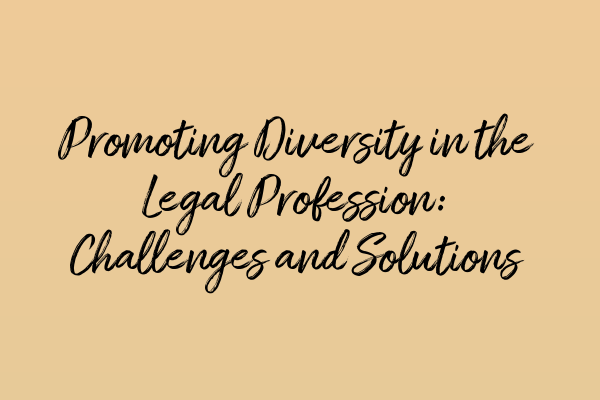Promoting Diversity in the Legal Profession: Challenges and Solutions
In recent years, the legal profession has recognized the pressing need to promote diversity and inclusion within its ranks. As society becomes more diverse, it is crucial for the legal industry to reflect and effectively serve the diverse needs of the population it represents. However, there are several challenges that hinder the progress of achieving true diversity in the legal profession. In this blog post, we will explore these challenges and explore potential solutions to overcome them.
1. Limited Representation: One of the major challenges in promoting diversity is the lack of representation of underrepresented groups in the legal profession. Historically, certain groups, including women, people of color, and individuals from lower socio-economic backgrounds, have been underrepresented in legal careers. This lack of representation creates a barrier to entry and perpetuates the cycle of underrepresentation.
Solution: Law firms and legal organizations can take proactive measures to promote diversity by implementing inclusive recruitment and retention practices. This can include targeted outreach programs, mentorship opportunities, and unconscious bias training for hiring managers. By actively seeking out candidates from underrepresented groups, the legal profession can start to bridge the gap and create a more diverse workforce.
2. Stereotyping and Bias: Stereotyping and bias play a significant role in the lack of diversity within the legal profession. Implicit biases, whether conscious or unconscious, can influence decision-making during recruitment, promotions, and client selection. These biases perpetuate the notion that certain groups are more suited for certain legal roles or are less competent in the field.
Solution: The legal industry must prioritize diversity and inclusion training across all levels to mitigate the effects of bias. By raising awareness of biases and providing education on the importance of embracing diversity, we can dismantle stereotypes and create a more inclusive environment. Additionally, implementing objective hiring criteria and evaluation processes can help minimize the influence of bias in decision-making.
3. Work/Life Balance: The demanding nature of legal careers is another challenge that affects diversity. Long hours, high levels of stress, and limited flexibility can disproportionately impact individuals from diverse backgrounds, especially those with caregiving responsibilities or who face socio-economic constraints. This can result in talented individuals leaving the legal profession or being deterred from pursuing a legal career altogether.
Solution: To address the work/life balance challenge, law firms and legal organizations should embrace flexible working arrangements, such as remote work options, part-time schedules, and job-sharing opportunities. Providing support systems and resources for work-life integration can help individuals from diverse backgrounds thrive in the legal profession. Additionally, promoting a culture of work-life balance and setting realistic expectations can improve retention rates and attract a more diverse talent pool.
4. Lack of Role Models: The absence of visible role models from underrepresented groups can discourage aspiring lawyers from pursuing a legal career. Without relatable role models, diverse individuals may feel isolated or question their potential for success in the profession.
Solution: Encouraging mentorship programs and affinity groups within legal organizations can provide support and guidance for aspiring lawyers from underrepresented backgrounds. By connecting diverse individuals with successful role models who have overcome similar barriers, we can inspire and empower the next generation of diverse legal professionals. Additionally, celebrating and showcasing the achievements of diverse lawyers through media and networking events can help dispel the notion that success in the legal profession is limited to a certain demographic.
In conclusion, promoting diversity in the legal profession requires a multifaceted approach. By addressing the challenges of limited representation, biases, work/life balance, and lack of role models, the legal industry can create a more inclusive environment. It is crucial for law firms, legal organizations, and educational institutions to take proactive steps to attract, retain, and promote diverse talent. Embracing diversity and inclusion not only brings social benefits but also enhances the effectiveness and credibility of the legal profession as a whole. Together, we can work towards a future where the legal profession represents and serves the diverse needs of our society.


Leave a Reply